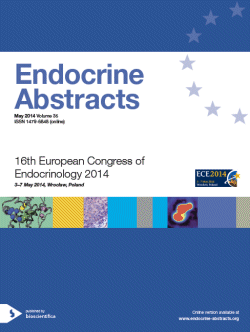Oral Communications
IGF-1 and Thyroid Basic
ea0035oc7.1 | IGF-1 and Thyroid Basic | ECE2014
GH induces chemoresistance in human endometrial cancer cell lines involving ERK 1/2 and PKCdelta
Zuolo Giulia , Minoia Mariella , Gentilin Erica , Gagliano Teresa , Tagliati Federico , Zatelli Maria Chiara , Uberti Ettore degli
ea0035oc7.2 | IGF-1 and Thyroid Basic | ECE2014
The proposed molecular mechanism underlying isolated growth hormone deficiency (IGHD) caused by C53S mutation
Sander Max , Wu Zida , Strasburger Christian J.
ea0035oc7.3 | IGF-1 and Thyroid Basic | ECE2014
Targeting the insulin-like growth factor 1 (IGF1R) and insulin (IR) receptor with a dual IGF1R/IR inhibitor, OSI-906, to potentiate mTOR inhibitor effects in experimental models of hepatocellular carcinoma (HCC)
Pivonello Claudia , Negri Mariarosaria , De Martino Maria Cristina , de Angelis Cristina , Napolitano Maria , Izzo Francesco , Colao Annamaria , Hofland Leo J. , Pivonello Rosario
ea0035oc7.4 | IGF-1 and Thyroid Basic | ECE2014
Training MCT10 to transport thyroxine: Structure based targeted mutations in MCT10
Schweizer Ulrich , Braun Doreen , Johannes Jorg
ea0035oc7.5 | IGF-1 and Thyroid Basic | ECE2014
Direct triiodothyronine effects in brown adipocytes
Schroder Erich , Perwitz Nina , Resch Julia , Klein Johannes , Lehnert Hendrik , Weitzel Joachim M. , Alexander Iwen K. , Brabant Georg




